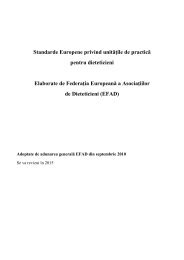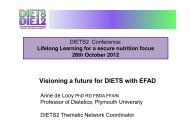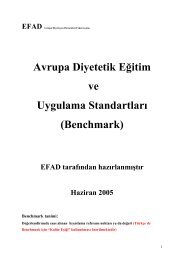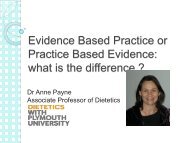European Dietetic Advanced Competences (EDAC) - Diets
European Dietetic Advanced Competences (EDAC) - Diets
European Dietetic Advanced Competences (EDAC) - Diets
You also want an ePaper? Increase the reach of your titles
YUMPU automatically turns print PDFs into web optimized ePapers that Google loves.
DIETS WP2 (2012-07-05).<br />
This document is aimed to dietitians in Europe and written by the Work Package „Second and third cycle competences for dietitians‟ of the<br />
Thematic Network of Dietitians (DIETS2, www.thematicnetworkdietetics.eu). The document will help us to better understand the competences<br />
required by dietitians who work or will work at advanced/ specialist level in Europe.<br />
The paper is arranged as follows:<br />
‣ Introduction<br />
‣ Glossary of Terms<br />
‣ Proposed <strong>Advanced</strong> Competence Framework<br />
Introduction<br />
Going from a newly qualified dietitian to an advanced level requires higher levels of knowledge and skills, as it includes significantly more<br />
demanding and complex work together with higher levels of responsibility and professional judgment. One of the <strong>European</strong> Federation of the<br />
Associations of Dietitians (EFAD) goals is to support the National <strong>Dietetic</strong> Associations (NDA‟S) to reduce inequalities and improve nutritional<br />
health in Europe. Part of this includes developing standards of competence at different levels of dietetic practice.<br />
In 2009, EFAD adopted the <strong>European</strong> <strong>Dietetic</strong> <strong>Competences</strong> and Performance Indicators (PIs) at a threshold level for entry into the profession<br />
(EFAD, 2005, www.efad.org ). Thereafter the profession and higher education institutions (HEI) in Europe began a process to ensure that all<br />
dietitians qualifying from their programmes have achieved these competences.<br />
The <strong>European</strong> Union is committed to the prevention and control of non-communicable diseases (EC 2007 & 2011) through more healthful nutrition<br />
and increased physical activity. Dietitians as nutrition experts can further advance their profession, their professional expertise and, working as<br />
autonomous professionals, support their user groups and other healthcare professionals regarding healthful human nutrition.<br />
Within the current context of Europe, the development of competence statements for dietitians post-qualifying is therefore highly relevant and<br />
important for the profession to support the achievement and implementation of these Resolutions and White papers. In additional and bearing in<br />
mind that the key ambitions of the Thematic Network for Dietitians (DIETS2) are:<br />
To prepare dietitians to be able to undertake and evaluate health promoting interventions and publish findings (enquiry led-learning)<br />
To support dietitians to develop and use contemporary communication and pedagogic/education methods (ICT)<br />
To enable dietitians to continually enhance their own expertise and relevance through lifelong learning (LLL)<br />
This paper defines the competences highly qualified dietitians should be able to reach after “some years” of practical experience combined with<br />
continued education and other experiences of Lifelong Learning (LLL). Practical work experience is essential to improve competence, but years in<br />
practice are not enough by themselves to reach advanced level. How a dietitian works and what LLL-experiences the individual chooses to<br />
undertake will be crucial in the process (see Figure 1). It is possible to work many years as an adequate and competent dietitian without reaching<br />
advanced level.<br />
2







